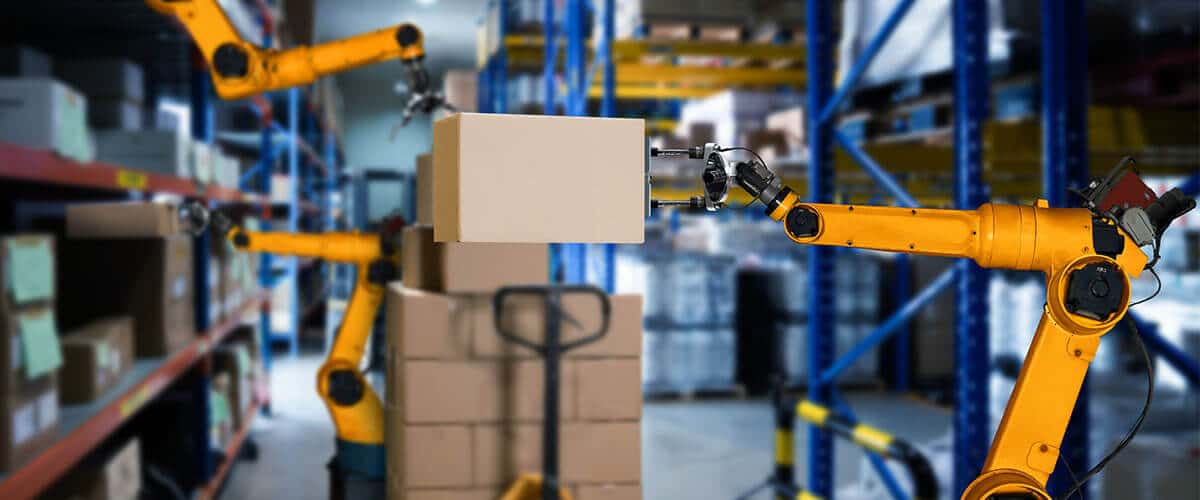Key Takeaways:
- AI adoption in hybrid fulfillment operations can lead to significant improvements in logistics costs, inventory levels, and service levels.
- AI technology assists warehouses in processing orders efficiently, identifying bottlenecks, optimizing storage, and making data-driven decisions.
- A Cloud-based fulfillment platform with AI capabilities streamlines both B2B and DTC operations, ensuring smooth inventory movement and enhanced picking processes.
- AI-powered Warehouse Management Systems (WMS) provide the visibility and control needed for successful hybrid operations.
- Leading ecommerce solutions, powered by AI, allow businesses to specify different picking processes for B2B and DTC orders, ensuring neither process is compromised.
In spite of complex supply chain and warehousing challenges, perfect order fulfillment has become the gold standard for today’s retailers and third-party logistics (3PLs). Whether you oversee business-to-business (B2B), business-to-consumer (B2C) or direct-to-consumer (DTC) operations, ensuring flawless delivery experiences and high rates of customer satisfaction is critical for growth and long-term success. For hybrid operations, this is even harder to achieve.
If you oversee hybrid fulfillment operations, you need the assistance of smart technologies like artificial intelligence (AI) to leverage complex fulfillment data, optimize complex workflows, and manage the costs of hybrid operations. AI helps to aid the accuracy and efficiency of hybrid order management by continuously improving automated processes, rooting out inconsistencies, and assisting with end-to-end fulfillment for multiple order types.
In this blog, we will dig into the rise of AI in hybrid warehousing, the benefits of AI in high-efficiency hybrid fulfillment, and how one Logiwa client transformed their hybrid operations using AI warehouse management.
In this guide, we’ll explore:
The Growing Role of AI in B2B/DTC Order Fulfillment
Over the past several years, warehouses have needed to evolve their services and technology in order to meet the demands of modern ecommerce. In addition to demand fluctuations brought on by the pandemic (which led to costly overstocking, inventory shortages, and supply chain problems), the industry faced a rise in direct-to-consumer (DTC) orders and new, competitive fulfillment solutions.
In order to manage bulk B2B orders alongside growing numbers of single/multi-item DTC orders, hybrid warehouses are embracing AI to take deliberate action based on operational data and support B2B and DTC clients fully. When AI is combined with warehouse management systems, hybrid operations reach new levels of data capture, storage, processing, analysis, and visualization for maximized efficiency.
According to a study conducted by Retail Info Systems 2021 study:
-
- Over the next 12 months, 30% of retailers plan on investing in AI and machine learning (ML)-infused replenishment, transportation management, and demand planning/forecasting technology.
- Over the next 24 months, retailers expect to supercharge warehouse and DTC operations with AI investments for predictive inventory planning (37%), predictive labor planning (30%), and robotic systems for picking and material handling (26%).
AI Adoption by Hybrid Fulfillment Operations
To improve hybrid fulfillment operations, you must be able to monitor and improve workflows systemically, automate manual processes, and minimize guesswork as much as possible – all things AI is geared to do. According to McKinsey & Company’s industry insights, businesses that adopt AI into their supply chain operations have seen a 15% improvement in logistics costs, a 35% improvement in inventory levels, and a 65% improvement in service levels.
In the previously mentioned Retail Info Systems study, researchers found that 70% of retailers and providers of consumer goods who added AI to their warehouse and supply chain approach realized major improvements to their automation and planning execution. Moreover, 56% said automating manual processes improved their ability to respond to changing demand.
When it comes to growing hybrid operations, you need to keep operational costs low while opening up your channels to future growth. The benefits of AI make this possible. Learn more in our resource, “The Critical Role of Artificial Intelligence in Warehouse Operations.”
Benefits of AI on Hybrid Warehouse Operations
Managing supply chain operations is hard enough without the added difficulties of juggling B2B and DTC orders. One of the primary reasons why is because humans often fail to recognise problems or inefficiencies in large amounts of data. However, AI can work without rest to analyze trends and use new insights to identify weak areas in your fulfillment processes, forecast demand, control inventory levels, schedule maintenance, and essentially keep potential failures from ever having the chance to occur.
AI technology can help you and your warehouse:
-
- Keep order processing fast, accurate, and competitive regardless of whether an order is B2B (which rarely requires order routing) or DTC (requires multiple ecommerce channels and dynamic routing across multiple fulfillment centers).
- Utilize existing data to identify bottlenecks in your hybrid fulfillment facilities for smarter and faster inbound logistics, inventory replenishment, picking and packing, returns, facility/tools management, and workflows.
- Get the most out of your warehouse facility/hybrid layout space by analyzing your inventory items, layout, and incoming orders to ensure items are stored for optimum efficiency, at the appropriate conditions, and as close to future buyers as possible.
- Make faster, more informed decisions and corrections based on consumer behavior, market trends, data predictions from your existing warehouse records, and efficiency reports to take analytics further.
- Automate shipping operations to honor B2B and DTC-specific needs (B2B warehouses rely on FTL/LTL carriers to make contracted delivery windows, while DTC fulfillment benefit more from rate shopping, multiple carriers and customized packing).
A Case for AI in Warehouse Management Systems (WMS)
Conducting B2B and DTC fulfillment in the same warehouse is not just possible, it might just be the future of warehousing. It requires dedicated planning and the help of high-tech solutions like AI. A Cloud-based fulfillment platform streamlines warehouse management processes and uses AI to aid both B2B and DTC operations.
For both B2B and DTC warehouses, warehouse management solutions provide the visibility and control needed to lay out successful hybrid operations. Custom algorithms and AI-powered software ensure your inventory is moving as smoothly as possible and alert you when it is not. Leading ecommerce solutions even let you specify different picking processes for the various areas of your business (ex. mass picking for DTC orders and first-come first-leave picking for B2B clients), so neither your B2B or DTC processes become strained or limited by the other.
For more insight into how leading WMS technology manages hybrid fulfillment operations, check out our case study with Badger Fulfillment Group. Using Logiwa’s direct putaway algorithms and AI-powered picking and packing, they were able to easily manage B2B, B2C, and location-to-location (LTL) order fulfillment while eliminating inaccuracies throughout their entire fulfillment network.
Join the future of warehousing with Logiwa
In the evolving landscape of warehousing, the integration of AI in warehouse management stands out as a game-changer. By streamlining operations, predicting market trends, and optimizing inventory processes, AI is redefining the standards of efficiency and accuracy in the industry. As businesses look to harness the full potential of AI-driven solutions, choosing the right tools becomes paramount. Dive into the future of warehousing with Logiwa WMS, and experience firsthand the transformative power of AI in warehouse management. To learn more about Logiwa WMS, reach out to our team of warehousing and supply chain specialists or request a demo today.
FAQs: AI Warehouse Management
Q: How is AI revolutionizing warehouse management?
A: AI in warehouse management is transforming the industry by optimizing operations, predicting market trends, and enhancing inventory processes, leading to increased efficiency and accuracy.
Q: What are the primary benefits of integrating AI into warehouse operations?
A: Integrating AI in warehouse management offers numerous benefits, including improved logistics costs, streamlined inventory levels, faster order processing, and the ability to identify and rectify bottlenecks in real-time.
Q: How does AI assist in managing both B2B and DTC orders?
A: AI technology aids warehouses in efficiently processing both B2B and DTC orders by analyzing trends, forecasting demand, controlling inventory levels, and ensuring optimal fulfillment processes tailored to each order type.
Q: Can AI help in optimizing storage and inventory in warehouses?
A: Absolutely! AI in warehouse management can analyze inventory items, warehouse layout, and incoming orders to ensure items are stored for maximum efficiency, under appropriate conditions, and in proximity to future buyers.
Q: Why should businesses consider Logiwa WMS for AI-driven warehouse solutions?
A: Logiwa WMS offers a cloud-based fulfillment platform that harnesses the power of AI to streamline both B2B and DTC operations, ensuring smooth inventory movement, enhanced picking processes, and overall operational excellence in warehouse management.






